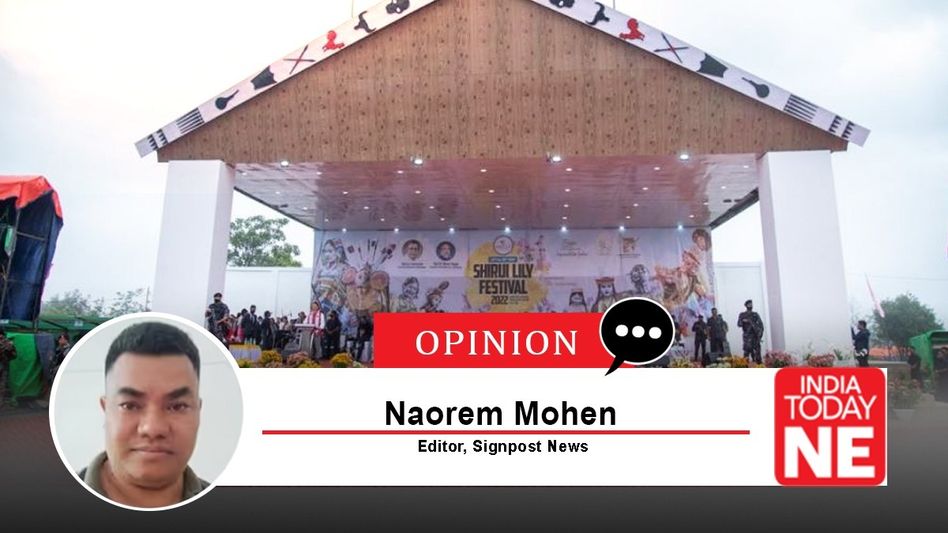Why Shirui Heritage Project and Other Development in Hills Are Being Sabotaged During PR in Manipur
In June 2025, D Gangmei, Chairman of the Hill Areas Committee (HAC) of the Manipur Legislative Assembly, sent a searing letter to the Union Home Secretary and Manipur Governor Ajay Kumar Bhalla, sounding the alarm on what he termed a “big scam” in the awarding of government contracts across hill and tribal districts of Manipur.

In June 2025, D Gangmei, Chairman of the Hill Areas Committee (HAC) of the Manipur Legislative Assembly, sent a searing letter to the Union Home Secretary and Manipur Governor Ajay Kumar Bhalla, sounding the alarm on what he termed a “big scam” in the awarding of government contracts across hill and tribal districts of Manipur.
This revelation has ripped open a festering wound, exposing a deliberate pattern of sabotage that threatens the development of Manipur’s hill regions during President’s Rule.
From former Chief Minister N. Biren Singh’s scathing critique of low-bid contracts to Tangkhul organizations’ urgent pleas for accountability, and now the inexplicable decision to entrust the Rs 64.99 crore Shirui Heritage Village and Bakshi Ground project to the woefully unprepared District Rural Development Agency (DRDA) Ukhrul, a grim truth emerges: funds meant to uplift the hills are being siphoned, diluted, or mismanaged.I see this not as administrative failure but as a calculated assault on the hill communities’ aspirations. The Shirui Lily, Manipur’s state flower and a symbol of cultural pride of the Tangkhul community, risks becoming a casualty of corruption unless Governor Bhalla intervenes decisively.
On April 19, 2025, former CM N. Biren Singh took to his Facebook page to expose a corrosive practice undermining hill infrastructure: the awarding of rigid pavement contracts at drastically reduced rates. In a passionate post, he cited bids for concrete roads in Jiribam (32% below schedule rate), Senapati (33%), Kamjong (32.56%), and Ukhrul (36.48%), questioning how quality could be maintained when contractors quote Rs 64-68 for a ₹100 estimate. “At this rate, we’re not just cutting costs, we’re compromising the future of infrastructure in these regions,” he warned.
N Biren Singh’s words highlight a stark disparity: while valley districts enjoy robust roads, the hills are left with crumbling pathways, fueling resentment and ethnic mistrust. This low-bid culture, prevalent during President’s Rule, invites corner-cutting and subletting, ensuring shoddy work that fails the hill communities.
The United Senior Citizen Forum (USCF) of 43-Phungyar Kendra amplified this concern on August 27, 2025, protesting the tender process for the widening of the Shangshak-Tengnoupal Road (NH-102A). The Ministry of Road Transport and Highways (MoRTH) sanctioned Rs 429 crore for this vital project under the 2024-25 Annual Plan, yet the lowest bid among 12 firms was a mere Rs 227 crore—a 47.2% reduction. At a press conference in Imphal, USCF leader David Zimik called this “unacceptable,” warning that such underbidding jeopardizes safety and durability in the challenging hill terrain. “This road is our lifeline,” he said. “Cutting costs like this is cutting corners on our future.” The USCF’s objections highlight a broader fear: during President’s Rule, tender processes lack oversight, allowing low bids to erode project integrity.
This alarm was echoed on September 15, 2025, by the Tribal Youth Council Manipur (TYCM), which submitted a memorandum to the Governor, Chief Secretary, and PWD Commissioner. TYCM demanded an end to lowest and minus-rate tenders in hill tribal areas, urging the cancellation of all such contracts awarded during President’s Rule. They called for re-tendering through reputable agencies like PWD, CPWD, or MES, adhering strictly to the Manipur Schedule of Rates (MSR/SR). “For ensuring the quality of work and the longevity of developmental assets,” the memorandum declared, “we cannot allow these practices to continue alienating hill communities.” TYCM’s plea reflects a growing consensus: minus tenders, unchecked under President’s Rule, are a death knell for hill development.
The latest blow came on September 11, 2025, when the Manipur Tourism Department’s Letter No. TP-T-1/5/2025-TSM-TSM assigned the Rs 64.99 crore Shirui Heritage Village and Bakshi Ground project to DRDA Ukhrul for tendering and execution. Sanctioned on August 20, 2025, under SASCI (Letter No. PLG2-7/5/2025-PLG-PLANNING-PART (1)), this project aims to transform Ukhrul into a global eco-tourism hub, with upgraded sports facilities at Bakshi Ground, a heritage enclave honoring the Shirui Lily, and infrastructure to support the annual festival that draws thousands of tourists, entrepreneurs, and traders. Yet, DRDA—a rural agency with only four technical staff (one Executive Engineer, one Assistant Engineer, one Technical Operator, and a part-time contractual OSD)—lacks the expertise for such a complex endeavor.
The August 25 Tourism Director’s Letter No. 4650/2025-DTSM had urged a “reputed work agency” to handle the project’s “technical complexity” and meet the “long-pending demands of the hill tribal Tangkhul people.”
Why has the directive to engage a “well-reputed” work agency been disregarded when Manipur boasts capable institutions like the Public Works Department (PWD), Manipur Police Housing Corporation (MPHC), Planning and Development Authority (PDA), Manipur Industrial Development Corporation Limited (MANIDCO), Manipur Tribal Development Corporation (MTDC), and Manipur Infrastructure Development Agency (MIDA), all with proven track records?
The District Rural Development Agency (DRDA) scheme, launched on April 1, 1991, aimed to promote quality development in districts. The central government covered 75% of staff salaries and administrative costs, with states contributing 25%. For northeastern states, the central share increased to 90% in 2008-09, while union territories received 100% central funding. Funds were released by the center to DRDAs, which implemented anti-poverty programs in rural areas under the Ministry of Rural Development. The DRDA’s primary role was to formulate policies, issue guidelines for central schemes, and sanction funds for administrative programs. The scheme was discontinued on April 1, 2022.
Instead, the Rs 64.99 crore Shirui Heritage Village and Bakshi Ground project has been handed to the understaffed DRDA Ukhrul, raising suspicions of deliberate mismanagement. Does this reflect a recurring pattern where funds earmarked for hill districts are diverted, leaving behind unfinished or shoddy infrastructure?
The hill districts’ painful history of fund mismanagement, often channeled through Autonomous District Councils (ADCs) under Chief Executive Officers (CEOs), casts a long shadow. RTI activists like P. Johnson Samo, P.R. Amose, Kh. Inoch, and S.P. Benjamin have faced death threats from NSCN (IM) cadres for daring to demand transparency. The National Campaign for People’s Right to Information (NCPRI), National Human Rights Commission (NHRC), and Manipur Human Rights Commission (MHRC) have repeatedly flagged the intimidation of whistleblowers, yet the threats persist. Past investigations, including those by the Comptroller and Auditor General (CAG), confirm that militant groups, sometimes with complicity from officials, have siphoned off state funds meant for hill development, perpetuating a cycle of betrayal that now endangers the Shirui project.
On August 27, 2025—coincidentally or not, just days after the SASCI sanction—GPRN issued a stern notification tightening regulations on developmental works in Manipur's hill areas. Responding to rampant malpractice in bidding and execution, it directed district officers to perform duties without negligence, banned quoting below schedule rates as a "deliberate compromise on quality," outlawed subletting to non-registered entities, and restricted percentage deductions to district headquarters only. Effective immediately, this edict aims to curb the very practices that have plagued projects like Shirui—subletting, unauthorized cuts, and low-bid sabotage. Yet, by assigning Shirui to DRDA, the government seems to defy this spirit, inviting the same maladies GPRN seeks to eradicate.
Similarly, the Kangpokpi highway scandal, first detected in January 2025 and fully exposed in July, epitomizes this systemic rot. Villagers displaced by NH-2, NH-37, and NH-102 expansions alleged that Kuki National Front (KNF) militants coerced them into signing blank compensation forms, siphoning Rs 300 crore. “We signed out of fear; the money never reached us,” one farmer confessed anonymously, noting militants. Complicit officials, failing to verify payouts, enabled this heist in the hills of Manipur.
We must rewind to the origins of the Shirui dream. It all began in earnest during the 2017 Shirui Lily Festival, when former Chief Minister N. Biren Singh captivated audiences with grand visions. Standing amid the blooming fields, he pledged paved roads winding through the hills, state-of-the-art stages for cultural performances, and world-class facilities to position Manipur as a premier eco-tourism destination. Locals, inspired by these promises, invested their own labor and resources into temporary setups, expecting reimbursements that never materialized.
By 2019, the initial euphoria had soured into disillusionment—no construction had begun, no funds had trickled down. The silence from Imphal was deafening, a harbinger of the neglect that has long plagued Manipur's hill districts.Fast-forward to May 2022, and Singh, now former CM, reiterated his commitments at the festival's fourth edition. This time, he announced Rs 46 crore under the Pradhan Mantri Jan Vikas Karyakram (PMJVK) for the heritage village and Bakshi Ground. He even floated the idea of cable cars in Shirui Peak, same as the one proposed in the floating islands of Loktak Lake—a bold, almost fantastical proposal that ignited imaginations. "Misappropriation will face the law," he declared emphatically. Yet, these words rang hollow, echoing the unfulfilled pledges that litter Manipur's developmental history.
The 2023 and 2024 festivals, disrupted by ethnic strife, exposed the rot further. When the event resumed this year under the theme "Preserve the Lily, Protect Our Heritage," attendees reveled in the natural beauty but couldn't ignore the glaring deficiencies: open sewage ditches pooling with filth, erratic power supply flickering like a thief's lantern, and zero progress on the 2022 blueprint proudly displayed on government portals under the slogan "Sabka Saath, Sabka Vikas." The irony is palpable—development for all, except, it seems, for the hills.
The Shirui Heritage Village and Bakshi Ground project is not just infrastructure—it’s the heartbeat of Manipur’s tourism revival and a lifeline for Ukhrul’s economy. Unlike valley districts, which have seen mega-projects, the hills have rarely received such a scale—Rs 64.99 crore is unprecedented. Bakshi Ground is Ukhrul’s sole large venue for ShiRock, a music festival drawing rock enthusiasts, and sports events that unite youth.
The heritage village aims to honor the Shirui Lily, positioning Ukhrul on the global eco-tourism map alongside sites like Bhutan’s Paro Valley. It’s projected to attract over 20,000 visitors annually, boosting artisans crafting Tangkhul shawls, homestay owners offering authentic experiences, and youth entrepreneurs selling lily-infused products. Economically, it’s a multiplier: jobs, revenue, pride.
Governor Ajay Bhalla's festival speeches ignited hope—now is the time to deliver. This is Manipur’s moral test. Demand a CBI probe into the DRDA handover, scrutinizing the Project Director and Tourism enablers. Reassign the project to PWD or any agencies with their proven expertise. Enforce open tenders via blockchain audits and involve Tangkhul CSOs for oversight. The Shirui Lily endures blizzards; Ukhrul’s spirit can too. But resilience has limits.
Copyright©2025 Living Media India Limited. For reprint rights: Syndications Today









